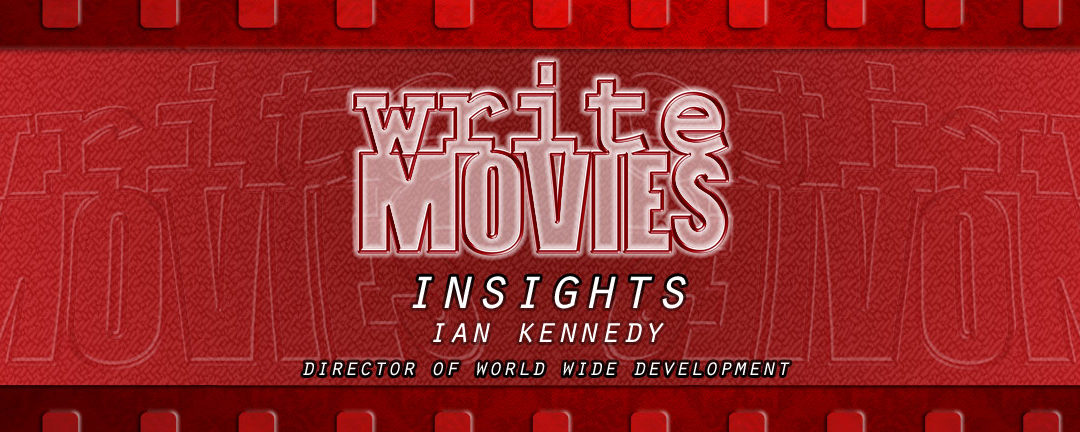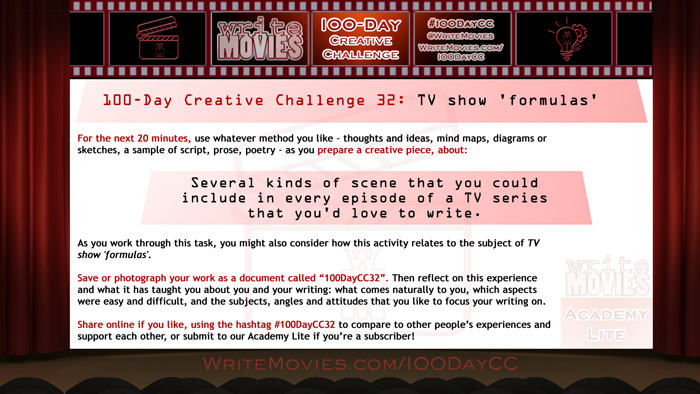
by WriteMovies | Sep 18, 2020 | Highlights, Ian Kennedy, Industry Diary, Pitching, Writing Insights
We work with several established directors, such as double Oscar-nominee and double BAFTA-winner Habib Zargarpour, both as producers and as analysts. We get to consider works for them to direct, or for us to produce with them attached as director, or just to recommend they consider. Sometimes we’re sent books or scripts by writers’ agents or publishers, other times we’re considering the submissions to WriteMovies, other times we put a call out for something specific we think we could sell right now. So while assessing recent submissions from publishers, I thought we’d share thoughts about how to select projects for directors, producers or actors as clients… (more…)

by John | Mar 25, 2019 | Updates
So, you’re thinking of writing a TV pilot. That’s great news – this is a great time to be writing for TV!
After years of living in film’s shadow, the TV series has stepped up and become a major medium in its own right.
The days are gone when a television series would struggle to tell a big, coherent story from first episode to the last. The subscription model of networks like HBO rewards a viewer’s commitment to a show, and the rise of streaming services such as Netflix has made it easy for audiences to keep track of their favourite shows, never missing an episode – and as a result, television has become the place to tell more complex stories. Instead of cramming dozens of characters and subplots into a 2-hour movie, you can now spread them out over multiple episodes and seasons.
But when it comes to introducing viewers (and before them, readers) to such a complicated story in a pilot episode can be difficult. When you’ve got lots of things going on, it can be easy to lose track of who’s who and what’s going on in each storyline as we rejoin it. So here are our tips for writing a TV pilot to help you on the way:
- Create clear and distinctive personal identities for each of your regular characters. That way, it’s easy to recognize who they are and what they stand for in all situations and how they relate to the other characters around them.
- Not sure how to do this? Try to explain each of your characters in a simple two-word epithet to make sure that they’re strongly defined. If you can’t, their personality and role isn’t clear enough!
- It helps to gel a multi-strange pilot if all the plots, characters, and settings have visible and regularly affirmed connection to each other. This could be a person who all the others meet or see, a place they all share, a motif that keeps coming up in different contexts (e.g. a word like ‘change’).
- Another way to connect everything together is to have a focal event that everyone is directly affected by, or which every subplot is building up to. It’s best if this is something that all the characters are aware is coming up at around the 3/4 point of the episode.
Writing a TV pilot can be tough – you need a full season to tell a complex story, but you’ve also got to introduce that complex story in less than an hour in the first episode! But keep these tips in mind, and you should soon be heading in the right direction.
And if you want more inspiration, take a look at Ian Kennedy’s series of articles on GAME OF THRONES, for his thoughts on how the show juggles a huge cast of characters and locations with only very limited screen time each!

by WriteMovies | Jul 23, 2018 | Ian Kennedy, Writing Insights
How to give Producers, Executives and Publishers what they say they want
If you haven’t already, check out Part One here!
In the first part of this article, Ian Kennedy wrote about how stories always show us an important aspect of life. Finding your voice as a writer involves recognizing the aspect you’re exploring and expressing it through the choices you make in your story…
 This is a key tool in focusing your script – to ensure that everything that’s in it shows clear choices by the writer which each reveal different, important and often subtle features of that aspect of life which they’ve decided to explore. What choices you make, and how you present them (i.e. your style, another little-understood word that is often used by producers, execs and publishers), gives your writing its voice.
This is a key tool in focusing your script – to ensure that everything that’s in it shows clear choices by the writer which each reveal different, important and often subtle features of that aspect of life which they’ve decided to explore. What choices you make, and how you present them (i.e. your style, another little-understood word that is often used by producers, execs and publishers), gives your writing its voice.
Here are some examples, they’re all just my own interpretations and summations of the stories mentioned but you’ll get the idea:
- “It’s about how life can be brutal and cruel.” This leads us to: “GAME OF THRONES explores a vivid fantasy world that is brutal and cruel, but where you can thrive if you’re tough enough, whether you’re a man or a woman.”
- “It’s about how life can be threatened by chaos and injustice.” This leads us to: “BATMAN battles a world where criminals and injustice threaten to turn our civilization to chaos.”
- “It’s about how life can be determined by what’s in your heart.” This leads us to: “STAR WARS is about how even the biggest cosmic battles come down to the goodness or darkness in people’s hearts.”
- “It’s about how life can be trapped in eternal childhood for some people.” This leads us to STEPBROTHERS, and other comedies.
- “It’s about how having the biggest brain doesn’t always make life easier.” THE BIG BANG THEORY.
- “It’s about how some people have special abilities or powers and have to decide how to use them right.” – Any superhero story. (Technically, Batman doesn’t have any superpowers, but hey, he’s rich and runs a huge tech-innovation company, so that’s the next best thing.)
For me, it’s both the choice of the aspect of life they want to explore, and the way that they then go on to explore it, which gives the writer their “voice”. Make a conscious choice about the aspect of life you want to explore, the many forms it takes and how you can dramatize those in a way that feels convincing (within the internal logic of your story world – even if that’s a silly or surreal one like MONTY PYTHON), and show how that aspect of life creates dilemmas and issues with important repercussions for your characters and their story world, which you can resolve in a way that shows your conclusions about these questions, and give us an answer we can go away with. As McKee explains, it could be a “This means that this”, a “This means that this, but also means this”, etc.
So for choosing your ending, this comes down to the ‘moral of the story’: your ending should reflect the message and new understanding you want us to take away from the story about life, particularly about ‘life in a world like the one we see in this story’. A message like, “in a world like this, hope always triumphs” or “in a world like this, hope is an illusion”. And you should focus your story on exploring all the features of the aspect of life you’re exploring, and bring us to a conclusion that’s both dramatically, emotionally, and intellectually satisfying conclusion which gives an answer to the big questions you’ve asked.

I believe that all great writing teaches us something about the world, that we didn’t already know or hadn’t understood in this way before. That’s why we want to live out alternative lives through characters and worlds that – if we’re honest – we’d run a mile away from ever having to live as. From their struggles and dilemmas, we take back lessons that enrich and inform our lives, for the better. Even grim stories, enrich our understanding of life for the better, and help resolve us not to let our world turn out that way.
In all of this, the writer’s voice is revealed, and proves itself to be unique. So. Focus your writing on what I’ve explained here, and as you’re applying it to every passage of your work, ask yourself whether your telling of this is fully convincing. Because that’s then the main obstacle to getting greenlit, once you’ve found your voice and proven yourself as a writer.
Develop your voice as a writer with even more in-depth advice from an industry expert: check out our Elite Mentoring and script development services!

by John | Jul 2, 2018 | Ian Kennedy, Writing Insights
In films such as AVATAR, THE PLANET OF THE APES, and even the recent BLADE RUNNER 2049, not to mention TV series like WESTWORLD, we are starting to see that more and more humans as bad guys. In cinema’s constant hunt for new villains, stories reflect how we’ve banished the monsters and hazards from our real world, only to find our worst demons in the mirror and deep inside ourselves.
But why are big Hollywood companies risking hundreds of millions on films where the main villain is, well, us? Why would they risk it all, on us paying to go and blame ourselves for what’s wrong in their fictional worlds? Cinemas are usually the place we go for escapism – to get away from what’s happening on the news. If people are causing so much bad news, why would we want to see that amplified on screen?
In AVATAR, we enter an idyllic eco-topia where all nature – however scary – turns out to be symbiotic, and the threat comes from the human invaders who are determined to ravage the planet for its resources. Our protagonist is human – but lives most of his life in the film as a Nav’i and joins with the planet’s forces against the humans.
In the most recent PLANET OF THE APES trilogy, the human-centric story of the 1968 original – which saw humans struggling to survive in an society ruled by apes – is not merely discarded but inverted. We now find ourselves primarily following the ape CAESAR, who fights to lead his people to safety in a world where they are hated and feared by human beings.
And in BLADE RUNNER 2049, Ryan Gosling’s character – like Harrison Ford’s before him, we finally confirm – is the latest in a long string of replicant assassins employed to kill his own kind, to protect humans from the repercussions of their own creations. The story’s sympathies are clearly with the replicants, not the humans, taking the established Blade Runner theme of ‘what it means to be human’ to a new level.

Volcanoes: less often the villain now than humans.
Just watch a news broadcast, and ask yourself ‘who are the villains here?’, and ‘what’s causing the problems here?’. Apart from earthquakes and volcanos, you’ll usually only get one answer: people. Even when the problem is ‘nature’, like fires and hurricanes, we’re slowly having to admit that actually yeah, we are making things worse, putting ourselves in the firing line when we could live in safer places, and even causing many problems in the first place. A constant flow of research articles and bad-news stories tells us that we humans have enormous influence over the world around us, even if we can’t control it or ourselves.
This is reflected – unsubtly – in AVATAR. Like the earthly colonialists of recent centuries, the humans in AVATAR arrive under the guise of exploitative “trade”, backed up by formidable military intent. Like Vikings and colonialists of our world in past centuries, they are determined to get their way – whether peacefully or by violence. They come to a thriving tropical word, and pillage it for their own needs – sound familiar? The devastation caused by the humans is felt equally by the native species, the animals and even the plants, and this causes some humans to change sides and help the victims, like how people today try to help ‘save the rhinos’. The rest of the movie is totally told from the side of the natives, who our protagonist joins and even becomes.
In the news, we’ve also seen the tribal biases of the past starting to give way to a more balanced view. News stories used to put us solidly on one side of the important divides of the time (humans good, nature dangerous; ‘Western countries’ good, ‘Eastern countries’ bad; ‘civilization’ good, ‘primitive’ cultures bad…). But decades of peace in most of the world have given us the time to take a better look at ourselves, instead of ganging up together against the ‘other’. In fact, these days the news agenda and emphasis is mostly on the victims of war, crimes and abuse (such as sexual harassment or other cruel things done by ‘bad people’ to ‘innocent people’), and we’re much more suspicious than supportive of our leaders and politicians.
In most countries, the news media now is much more likely than before to take the side of victims, and even to fight to tell their story, rather than helping governments and powerful people cover up their abuses and mistakes – even if it often takes famous cases to bring much more widespread everyday abuses into the public eye, such as the Hollywood sexual harassment revelations focusing on the “big name” perpetrators and victims. In the past, history was always written about ‘great men’ who dominated their times. But these days, we emphathize more with the victim than the powerful aggressor. Filmmakers are using this angle in their films to reflect this concern by giving center stage to the victim of a story as opposed to whoever is causing the damage.
Top filmmakers will take the element of escapism and use it to reflect what is going on in the real world. They’re just tapping into the underlying messages behind our modern world and the news we consume every day. These films work because they tap into what we’re preoccupied with, what we now recognize, or think we understand, about the real underlying logic of our world. Filmmakers and production companies have to respond to our modern fears, expectations, preoccupations and feelings in order to tap in to them, get ahead of the curve, and create a cinematic experience that will stick with us. People who aren’t interested in GAME OF THRONES mostly assume it’s ‘just a fantasy story’, when actually it takes the world of fantasy and spins it, to tell vivid stories about some very modern preoccupations – female empowerment, and the brutality of fate – that they’d probably be a lot more interested in.
Why, though, are we happy to go see a film that villainizes humans rather than the aliens or monsters of past films? Well, nowadays people are more open minded than we used to be – peace makes that possible. Where we used to see other cultures as dangerously different, we can now recognize them as the victims of our own culture and values.
THE DARK KNIGHT trilogy mostly works well as a piece of superhero escapism and a reflection of our fears of domestic chaos and terrorism. AVATAR succeeds with its outlandish sci-fi setting and the eco-allegory about rainforests and nature in a symbiotic but fragile harmony.
So, like us, many Hollywood and filmmakers have recognized that humans are the problem – that we are the only real bad guys in this world, now we’ve crushed the monsters and natural environments that created so many threats to us in the past. They are now using this to tell stories from the point of view of humans’ victims, to create compelling stories where we can empathize with the characters victimized by people like us, and recognize the demons and drives within ourselves that cause problems for others in the world.
Then again, maybe it’s just because humans have got so powerful in our own world that we don’t have many other places to turn when we’re looking for villains and excuses for blockbuster mega-stories. Either way, it works.













